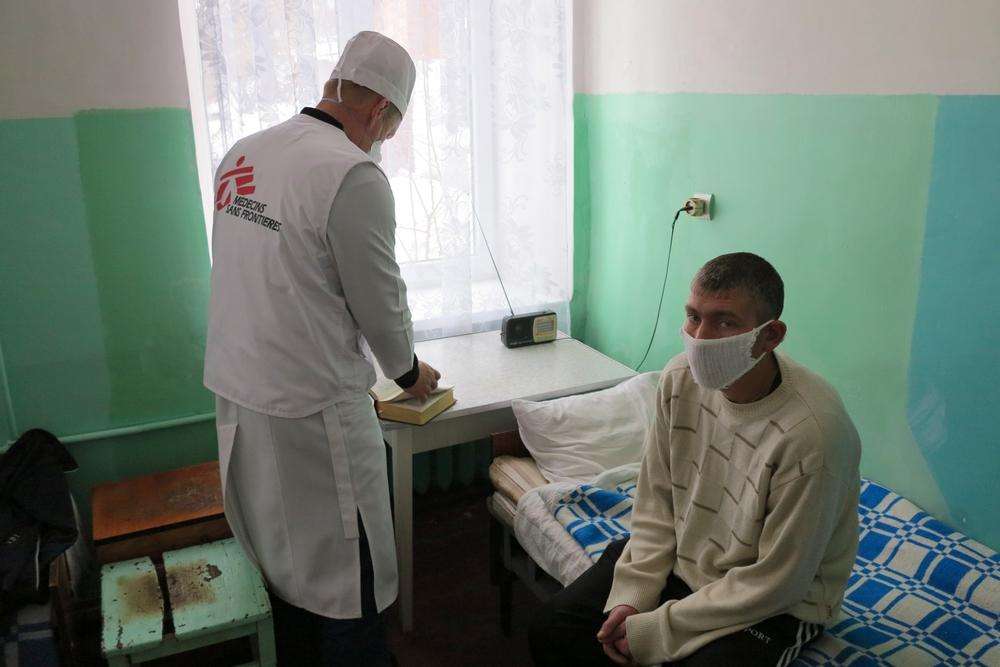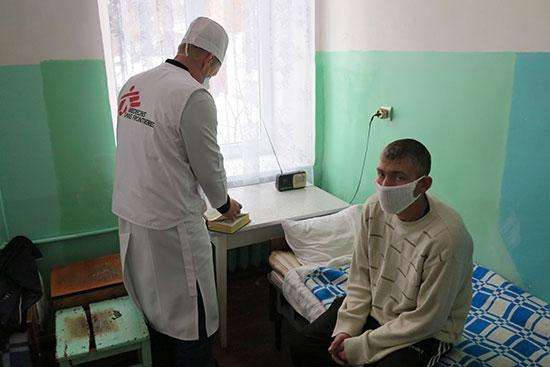Once considered a disease on the decline, tuberculosis (TB) has seen a resurgence in Ukraine and several other post-Soviet countries that endured social and economic tumult after the collapse of the Soviet Union. In Ukraine, the country’s prisons in particular are a hotbed for the disease, with prevalence rates more than ten times higher than in the rest of society. Doctors Without Borders/Médecins Sans Frontières (MSF) provides treatment and support to over 140 inmates and ex-inmates suffering from multi-drug-resistant (MDR) TB in eastern Ukraine’s Donetsk region.
“It’s hard to sit up and I’ve got pain everywhere,” says Andriy*, 31, in a coarse voice from behind a white protective mask. A drunken brawl a few years ago lead to a jail term for violent assault and also put an abrupt end to his vocational training as a construction worker. Half a year ago, while still in prison, he was diagnosed by MSF with MDR-TB. His body is now thin and frail, and he says he has abandoned all hope of having a family and living a normal life until he is cured.
Over the next two years, Andriy will have to adhere to a strict regimen of six different TB drugs each day, a cocktail that often produces painful side effects like nausea, vomiting, and loss of sight and hearing. “It’s hard to stand it, but if I don’t continue I will just fall apart,” he says.
About 9,500 people developed MDR-TB in Ukraine in 2011, according to the World Health Organization. The number of new MDR-TB infections in the country has been rising steadily due to outdated prescription practices, an insufficient supply of drugs of often questionable quality, and a lack of access to diagnostic tools. Interruption of or non-compliance to treatment are also major contributors to the development of TB drug resistance. As an airborne infectious disease, it can be transmitted directly from one person to another, especially in overcrowded settings such as prisons. People living with HIV are usually more susceptible to developing the disease due to a weakened immune system.
The Donetsk region—known as the industrial heartland of eastern Ukraine—has been hit particularly hard by the HIV/TB epidemic, partly due to high rates of intravenous drug use. Since June 2012, MSF teams have been working inside three pre-trial detention centers as well as in Colony 3, an 800-bed prison hospital where prisoners diagnosed with TB are held. All inmates in Colony 3 are male and are kept in sparsely equipped cells that house approximately ten people each.
MSF provides diagnosis and testing, medical treatment, and psychological support to help MDR-TB patients continue taking their medication. MSF has also rehabilitated lab facilities and introduced infection control measures to prevent transmission of the disease within the prison. MSF also provides antiretroviral (ARV) treatment to patients that are co-infected with HIV.
Inside the prisons, overcrowding, poor ventilation, and frequent prison transfers exacerbate the spread of the disease. Weak nutrition from poor diets also makes prisoners more susceptible to falling ill. Almost half of the patients hospitalized in Colony 3 suffer from drug-resistant forms of tuberculosis.
Many prisoners come from difficult socioeconomic backgrounds where the burden of disease is already high. “Prisoners are a particularly vulnerable group,” says Yulduz Seitniyazova, MSF’s Head of Mission in Ukraine. “They are all living a hard life. Some have a history of drug abuse and alcoholism. They face so many problems, and many don’t believe that taking medication should be a number one priority.”
Before an individual is initiated on treatment, the MSF team strives to ensure that he is committed to stick to the long and painful treatment course. “He needs to know what treatment involves from the very start, and if things get tough we try and motivate him to continue,” says Yulduz.
On an international level, MSF campaigns for the research and development of better treatment regimens that are more effective, affordable, less painful, and do not put the lives of patients on hold for two years, as in the case of Andriy.
Once patients are released from prison, MSF collaborates with Ukraine’s Ministry of Health and other organizations to ensure that patients complete their treatment. This collaboration includes medical and psychosocial follow-up visits, along with adherence support and monitoring of side effects. Patients who default from treatment are traced in order to ensure that they continue. So far, 18 patients in MSF’s project have been released from prison, and 16 of them are still adhering to the treatment regimen.
“Some have no homes to return to. Some run a great risk of falling into alcohol and substance abuse, which will reduce the chances of adhering to treatment,” says Yulduz. “It’s important that these patients also get the necessary support once they’re outside the prison walls to enable them to continue treatment until they’re cured”.
*Patient name changed.





